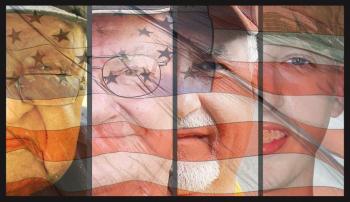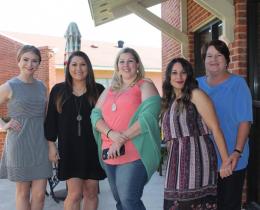
From left to right are: World War II Veteran Bervic Celestine, Navy; Korean Veteran Derrel Ardoin, Navy; Vietnam Veteran Joseph J.D. Soileau, Army; and Sergeant E5 Lance Miller who has served two tours in Afghanistan with the U.S. Army. (Gazette photos & illustration by Elizabeth West & Raymond Partsch III)
Through their eyes
By: ELIZABETH WEST
Associate Editor
Many Americans will spend tomorrow, Memorial Day, preparing bar-b-que to enjoy with their friends and family, but for four United States soldiers from Evangeline Parish this holiday is more than just a day free from work.
This day for America’s military is one that reminds them of the horrors of war and the brothers and sisters they have lost along the way.
Vietnam Veteran Joseph “J.D.” Soileau said, “On Memorial Day, I am always reminded of just how lucky I am to have made it out alive,” while Korean Veteran Derrel Ardoin said, “I am reminded of the things that most veterans will only talk about with other veterans. To talk to others who understand what you have been through helps relieve some of the pain a lot of us still feel.”
Those who have fought in combat are left with experiences engraved in their minds that World War II Veteran Bervic Celestine said, “You can never forget.”
When it comes to remembering their brothers and sisters, Lance Miller, who fought in Afghanistan, said, “This is America’s day to reflect on the ones who took it further than anyone else. It’s a day to remember the ones who gave the ultimate sacrifice, their life.”
Each of these men served the same country in combat, but their experiences fighting to defend every Americans’ freedoms have been slightly different.
Celestine, who joined the United States Navy because he said “it was my duty,” was at Pearl Harbor the day that Japan awoke a sleeping giant and filled him with a terrible resolve.
Celestine was a cook at Pearl Harbor, but as Japanese planes flew over the military base that was now his home on December 7, 1941 his combat training kicked in and the man from Mamou jumped to his brothers’ side to fight and defend.
“Everybody was surprised when bombs began being dropped on us,” said Celestine. “It’s hard to explain what that is like. It was scary, but all I knew to do was grab my rifle and start shooting at the enemy. I had my brothers to protect, so that’s what I did. But, you are really shaken up after you experience something like that. You try to forget things like that, but you can’t. I will die with those memories.”
When asked what he would tell the soldiers that have been killed in action defending the U.S.A., Celestine said, “Job well done.”
Ardoin, who joined the United States Navy against his dad’s wishes, had the job of doing “damage control” when other ships had been hit by the Korean enemy. His time at war during the years of 1951-1953 has plagued his life with remembrance of the constant sounds of weapons being fired.
Ardoin said, “There were no quiet moments out there. Even when other ships relieved you, so that your ship could reload on ammunition, the sounds never stopped, and then it was your turn to strike again.”
Those sounds have lived with the Ville Platte man even to this day.
“It’s not as bad today, but some things still trigger those memories,” said Ardoin. “When I first came home though, and I would hear thunder roaring it was difficult because it would remind me of the constant sounds of weapons being fired, and shells being shot.”
At 21-years-old, while at sea Ardoin experienced his own close call with death.
Ardoin said, “There were these chain stairs that we had to go up and down to close hatchets, and one day while I was going down the stairs they broke and I messed my knees and chin up. Until a seaplane could come get me and bring me to the hospital, I had to stay on the boat and the doctors aboard had to keep draining the fluid from my knees.”
The seaplane eventually arrived, and Ardoin was taken to Japan where he had surgery on both knees at a naval hospital.
Ardoin said, “You saw terrible things in there. There were people in full body casts with just a spot cut out in the front and back so that someone could come and turn them over to use the bathroom. I saw so many people with arms and legs being amputated, and those sites stay with you forever.”
For Soileau, of Ville Platte, his experience during the year 1970 in the jungles of Vietnam only lasted two months. That two months however, with the United States Army, was long enough for Soileau to personally feel the wrath of warfare.
Soileau said, “My first mission on the border of Cambodia I got wounded by shrapnel.”
The shrapnel, or large piece of metal, came from friendly fire and forced Soileau to undergo multiple surgeries to repair his damaged upper left arm which today is marked with a massive scar reminding Soileau of what he endured.
Soileau said, “Before I could be taken to Japan to have surgery on my arm they first had to get me out of the jungle, or bushes like we called them, and I was conscious the whole time. No helicopter could land though, so they flew over us and lowered a basket that I was then put into so that I could then be pulled up into the helicopter.”
Once he made it out of the Vietnam jungle, Soileau was on his way to Japan for his first of many surgeries.
“Before I had the surgery I was asked if I knew anyone in Japan, and I told them yes, Ted Fontenot, who I knew from back home.” said Soileau. “When I woke up from surgery Ted was right there at my bed side. It was nice to wake up and see a familiar face there.”
From there Soileau was flown back to the states were he had another surgery in Illinois, and then later he had his last two in New Orleans at the Veterans Administration (VA) Health Center.
When it comes to Miller, who served two tours in Afghanistan from 2011-2012 and 2013-2014 with the U.S. Army, the threats he faced and potentially may face again now as a member of the U.S. National Guard is slightly different than what his predecessors encountered, but yet the danger remained the same.
Working as convoy security, Miller’s job is to move any supplies a unit may need at a smaller base, and to provide security to Afghanistan natives who also help transport supplies to American soldiers.
As Miller reflected on his two tours, he said “the first was the scariest because until you are there you can’t understand what it’s like.” But, he also said, “That’s when you find out who you really are and what you are made of.”
What makes Miller’s experience different than the ones that have come before him according to the Pine Prairie resident is “the weaponry.”
Miller said, “Our greatest threats are the IEDs (Improvised Explosive Device) that the Taliban plant under roads, vehicles, and pretty much anywhere that they can hide them. The Taliban’s mission is to hurt us, and IEDs are their way of doing it.”
What makes the IEDs so dangerous, according to Miller, is the fact that “you never know where the enemy is.”
Miller said, “When they are shooting at us, we can tell which direction the shots are being fired from, but if an IED blows up one of our trucks we have to hurry to try and recover all of our stuff as quickly as possible. We have to get everything out of there before the Taliban has a chance to come an attack us.”
While Miller has witnessed IEDs blowing trucks of American soldiers up, it was what he called “smaller fire” that ended up taking the life of one of his closest friends in the military, Mabry Anders.
“The Afghanistan police help us, but sometimes the enemy will dress up like the police, and that’s what happened to one of my buddies that I went through basic training with,” said Miller. “And if I could tell him one thing today about his service, it would be thank you for serving and giving your life for our freedoms.”
Each one of these Americans served their country at different times and against different enemies. But, even though the threats they faced were somewhat different, their mission to keep the United States of America safe was the same.
The greatest thing of all, is the fact that when asked if they would do it again, Ardoin said, “Yes, I would,” and the other three soldiers echoed that same response.
Miller said, “I would do it again in a heartbeat,” while Soileau said, “If it wouldn’t be for veterans we wouldn’t be able to enjoy the freedoms that we have today, so yes, I would serve my country again.”
The oldest of these soldiers, Celestine, said, “I will always be proud to be an American. I took a chance for my country, and I would do it all over again.”
- Log in to post comments

